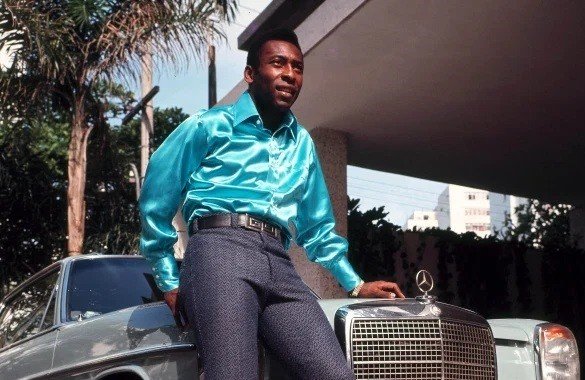HE is the footballing legend who scored 12 goals in 14 World Cup matches — and had so many affairs that he must have lost count.
Now, at the age of 80, Pele lays bare how he took advantage of women throwing themselves at his feet during the height of his sporting fame.
And the Brazilian hero, who has been married three times, admits he has fathered so many children that he had been unaware that some of them even existed.
Pele has seven known offspring, including Sandra Machado — who he refused to acknowledge even after the courts ruled in 1996 that she was his daughter.
Five of his children — Kelly, 54, Edinho, 50, Jennifer, 42, and twins Joshua and Celeste, 24 — came from his first two marriages to Rosemeri dos Reis Cholbi and Assiria Lemos Seixas.
Sandra, who died from cancer in 2006, was the result of an illicit romance with housemaid Anisia Machado. An affair in 1968 with journalist Lenita Kurtz produced daughter Flavia, 52.
But in a new documentary out next week, Pele claims that he told his wives and girlfriends that he was unfaithful.
He says: “My first wife, first girlfriend, knew about it. I never lied.”
While that may be true, playing the field was a one-way street for Pele.
Maria da Graca Xuxa — a 57-year-old former model who started seeing Pele when she was just 17 — revealed last month: “He said it was an open relationship, but open only to him.”
In the Netflix film, simply entitled Pele, the South American shows a lack of ego normally associated with preening footballers.
Shuffling carefully with his Zimmer frame, it is hard to believe elderly Pele was once the soccer superman who left countless defenders flat on their faces with his deft turns of speed.
He has been dogged by health problems including a hip operation, infection and prostate condition.

‘We came from nothing, we didn’t have much’
With his infectious grin, sublime skills and unmatched goal-scoring record, Pele has long been regarded as the best advert for the beautiful game.
While his rival for the title of the greatest player of all time, the recently deceased Diego Maradona, was constantly dogged by scandal, the Brazilian has been venerated.
A United Nations goodwill ambassador, he scored a remarkable 1,283 goals in 1,363 games, and is the only man ever to win three World Cups.
Born Edson Arantes do Nascimento, his parents were poor even though his father Dondinho played football for one of the top teams in the south eastern Brazilian state of Minas Gerais.
As a young boy, Pele would play with a ball made from a sock stuffed with paper and earned money by shining shoes before turning professional.
He says: “We came from nothing — we didn’t have much. We were poor but my father always worked.”
It didn’t take long before his goalscoring talents were noticed.
When his youth team coach Waldemar de Brito took Pele to Sao Paolo side Santos, he told them the 15-year-old unknown would become the “greatest player in the world.”
Less than a year after making his league debut, Pele was called up for the national side and earned his first cap aged 16.
The following summer, in 1958, he played a major role in Brazil’s first World Cup victory.
Back then, some locals at the tournament in Sweden had never seen or met someone black.
Pele recalls: “This Swedish girl kept rubbing my skin to see if it would come off.”
In the final, the striker scored two amazing goals, including one where he flicked the ball into the air before volleying it, as his side defeated the hosts 5-2.
After that, everyone in the world had heard of Pele, with people calling him the king of Brazil.
He says: “I couldn’t go outside. Everywhere I went, people came up to me.”
Pele had women flocking to his door from a young age.
The constant attention of young women, who would cuddle up to the hero to have their photos taken, was tough on his first wife, who he wed in February 1966 when he was 25.
Pele had known Rosemeri for many years and he believes he was not ready to tie the knot with her. He explains: “I married her because I met her when I was too young. I liked her a lot. But that passion when you are madly in love — we didn’t have any of that.”
Their son Edinho developed a serious drug problem when he grew up and got involved with the trade of illegal substances.
In 2017, the former goalkeeper was jailed for 12 years after being found guilty of drug trafficking and money laundering.
Pele’s first marriage ended in 1982 after he was romantically linked to Brazilian model Xuxa, who later dated Formula 1 star Ayrton Senna.
It took him another 12 years to walk down the aisle again, this time with gospel singer Assiria, but that ended in divorce in 2008.
With all that personal turmoil it is perhaps surprising that Pele describes “getting knocked out of the World Cup in England” in 1966 as “the saddest moment in my life”.
Having won two World Cups in a row, Brazil arrived as the favourites to lift the Jules Rimet trophy at Wembley Stadium.
But they could not cope with a much more physical approach to the game, which saw defenders hacking down Pele in full flow.
‘At that moment, I didn’t want to be Pele’
After they were knocked out in the group stage, he announced, at the age of just 26: “I don’t intend to play in the World Cup again.”
It needed a firm word from Brazil’s military junta to persuade their star player to change his mind four years later.
Some critics claim that the conservative Pele was too cosy with the country’s brutal dictator Emilio Medici.
The player, who met and shook hands with Medici, admits “my doors were always open” to the government and that he knew about the state-backed tortures.
But he knew that speaking out against the regime could result in a person being “disappeared.”
Having agreed to return to the pitch, the still brilliant player was now gripped by terrible self-doubt and asked his manager not to select him for the starting 11 in Mexico 1970.
He recalls: “At that moment, I didn’t want to be Pele. I didn’t like it. I prayed this was my last World Cup.” Even half a century on from that tournament, he weeps in the documentary as he recalls seeing the Brazil fans lining up in the streets to celebrate their success in the group stage.
Anyone who questions what the game means to Pele only needs to watch this film. Through tears, he says: “I needed this World Cup.”
He got it through sheer strength of will, scoring a header plus two selfless assists in his side’s 4-1 victory over Italy in the final.
Even though the star made a fortune through advertising deals — including famously, promoting Viagra — money was not his number one motivation.
Turning down moves to top European sides, he stuck with his first team Santos throughout the majority of his career before joining New York Cosmos at the end. More then ten million people watched his debut on US TV in 1975.
Pele now lives in a beachfront mansion near Sao Paulo with his third wife Marcia, 48, who he married in the summer of 2016, but is not seen publicly very often due to his health problems. Thanks to his artistry on the pitch, he will always be cherished by the fans.
And the lack of vanity from the true king of football will continue to endear him to anyone with just a passing interest in the sport.
Glory, Pele concludes, was not what the game gave him.
He says: “The greatest gift from victory isn’t the trophy, it’s the relief.”
- Pele streams on Netflix from Tuesday.
- SUN UK




